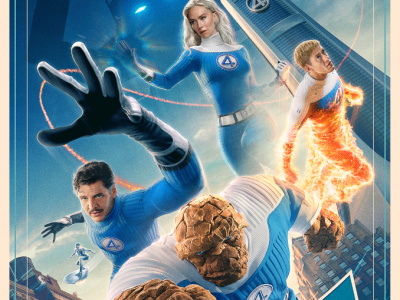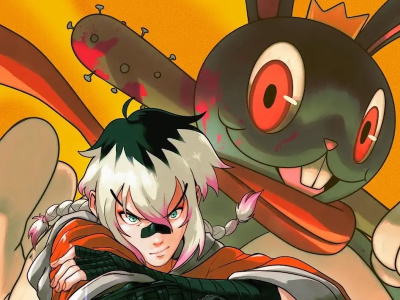
We sat down with DC Comics President and Publisher Paul Levitz in San Diego recently to catch up on topics of interest. In this first part of our two-part interview, we talk about the market for comics and graphic novels, what's happening in the bookstores, and how DC's toy business is changing with its new Mattel deal.
First I'd like to talk a little bit about what you see happening in the market. One question I think a lot of people are asking is what's happening to the number of comic stores.
I haven't pulled any stats on it, but I don't have any sense that it's changed dramatically. The number of bookstores carrying comics has changed dramatically this year because a couple of the chains had moments of ratcheting up from effectively only the 'A' stores carrying paperback graphic novels to 'A' through 'C' stores, so we had a couple of moments there of enormous pipeline feed in the spring which was very exciting. But I think the comic shops themselves have been pretty stable.
How's the sell-through been in the bookstores?
Really solid. Trade paperbacks are historically a decent category for sell-through, and then comics are further positively affected because bookstore sell-through is most largely a function of best-sellers. The books that really collapse are The Scandalous Biography of Blank that doesn't reveal enough about their sex life. Or the biography of Rudy Giuliani that's attempting to make him a bad guy that comes out on September 12th. Those are books that get ordered in by the millions from the home office to the bookstores. Nobody gives a shit. They all go back.
Comics have the benefit that, so far, the open-to-buy ceiling is fairly low, certainly on any individual title. None of the publishers, at least that I'm aware of, have gone in and hyped anything dramatically out of proportion. Much more of the sales are coming through on the basis of either single case consumer demand or single-store, a store employee managing the section relatively well. All those things tend to push up your average sell-through.
The worst sell-through we ever had on the graphic novel category was a couple years ago when we were launching the Big Book section. We did a deal with one or another of the bookstore retailers for some premium end-cap kinds of space--very nice space, very nice product. They took in a terrific amount of it. It was a pretty good time of year, around the holiday season, I don't remember the exact dates. Six months later, eight months later, it just came pouring back out of the pipe. We net sold some extra units, I'm not sure we lost money net-net on it, but I don't think we made any. We certainly had a lot of dead trees in the deal. It's that kind of situation where you try to push the limit of what the natural distribution of it, where you can either have a much better situation or a much worse one because of the return of the unsold product in that channel.
Are you seeing other comic publishers taking those kinds of chances now?
I think as you see the bookstore market get sexier, you're seeing more and more people trying to maneuver for those kinds of promotional spaces. You got to know what you're doing. It's certainly an area where having veteran people, whether it's folks at CDS or the new guy at Diamond who just came out of Random House or some of the people we rely on in our company and in our corporate family, are real pluses. They're able to look for things and say, 'You know, this one's someone offering you the used car with the new paint job and this one, you're really being offered some real estate that's going to make a difference for your category.' You learn by experience. We guessed wrong in that instance with the Big Books, we probably had other situations where we guessed wrong as well that were less dramatic. I'm sure we will in the future. I would suspect that some of our competitors will have some batting average in it too, as they try those experiments.
In a more general sense--if you've got a lot more pockets available in bookstores, the bookstore management obviously feels that there was demand they weren't reaching.
Total volume is continuing to drive up, with our efforts on sell-through particularly being effective, at least for us. We have some advantages in managing that because we go through a very solid pipeline with our sister company. Makes it a little bit simpler for us than it does for our competitors.
How do you see the market for comics and graphic novels in the pop culture stores?
I would think that the market for comics in periodical form would be up a little bit this year, if largely on Marvel's resurgence, which both has a direct effect on the size of the category (because I think it brought back people who were traditional Marvel fans who were disenchanted), and it brought in some new people reacting to Spider-man. Then you have some feed-off as people experience that, 'I like comics, let me try something else that's going on.' I think there have been some positive steps in that. The graphic novel and trade paperback category continues to grow the customer base
All channels?
Yeah, again, we had a really wonderfully weird spring in the bookstore market, so the jury's still out a little bit to see what the full year's going to be, and in the same fashion comic shops had some supply issues in the first quarter with the transition to Diamond's [Memphis] warehouse. We had some unnatural negative bumps there, but it picked up pretty much to where we expected it to be after that. We'll see how the end of the year comes because we've got a lot of high-end stuff coming.
How about the figure and statue market?
We're relatively flat this year, up a little bit. It's kind of been a regrouping year for us in that, waiting for the end of the Hasbro license to free up some of the product categories that now will be more available to us.
That went to Mattel, right (see 'Mattel Snags DC/Warner License from Hasbro')?
Yes.
Did you carve out a bigger piece of that?
This is the first license we've done for our stuff since DC Direct has really been a meaningful business, and we were able to maturely look at the category and say this is what we need a licensee to do wonderfully and what they're great at (Mattel's a fabulous company and we're very excited about the product lines they're developing) and this is sort of the collector's part of the nexus that we have some unique special skills in, and we'd rather do this part of it ourselves, rather than have a licensee do it.
What part is that? The higher end collector products?
Generally speaking, the distinction between the collector who's likely to be in a comic shop, and the collector and mass market person who's likely to shop in a mass market environment.
Brought in by TV and...







